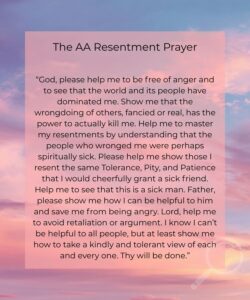Battling alcoholism means confronting your fair share of negative emotions. A common one is resentment–resentment towards loved ones who “let” you drink, resentment towards work or a person for stressing you out, and resentment towards yourself for letting things get out of hand. It’s such a pervasive issue that the Big Book of AA calls it the “number one offender” for destroying alcoholics. If you struggle with placing blame on others, join us in breaking down the meaning of the Resentment Prayer and how to apply it to your own life.
What Is Resentment, and Why Does It Matter?
Resentment is defined as “a feeling of indignant displeasure or persistent ill will at something regarded as a wrong, insult, or injury.” In short, feeling that you were wronged and treated unfairly, and being unable to let it go or forgive. It’s a poisonous feeling that can make us feel self-righteous at the moment, but irreparably harm our relationships with others and ourselves.
It’s something that many recovering alcoholics grapple with, but it can be highly detrimental to their recovery process. Why? Having feelings of resentment is in direct opposition to the core principles of AA: accepting personal responsibility for a drinking problem, getting rid of pride, and relinquishing control.
Not only are such feelings harmful to our mental health, but they are tremendously unproductive. It is similar to holding a grudge, but it only hurts you in the long run–the person you are upset with is usually oblivious to how you feel. Continuing to blame others for your own actions or shortcomings can signal that you’re not in the right mindset to move on to the other steps of AA and gain their full benefit.
Signs of Resentment
- Unable to stop thinking about the source of the insult for long periods of time
- Passive-aggressive behavior
- Avoiding the person to prevent negative emotions
- Desire for revenge
The AA Resentment Prayer
The prayer listed on page 552 is actually from a story titled “Freedom from Bondage” in the Big Book. This prayer is often called the “Page 552 Prayer.”
“God, please help me to be free of anger and to see that the world and its people have dominated me. Show me that the wrongdoing of others, fancied or real, has the power to actually kill me. Help me to master my resentments by understanding that the people who wronged me were perhaps spiritually sick. Please help me show those I resent the same Tolerance, Pity, and Patience that I would cheerfully grant a sick friend.** Help me to see that this is a sick man. Father, please show me how I can be helpful to him and save me from being angry. Lord, help me to avoid retaliation or argument. I know I can’t be helpful to all people, but at least show me how to take a kindly and tolerant view of each and every one. Thy will be done.”
This prayer is an exercise in replacing blame with compassion–something much easier said than done. The Big Book recognizes this by acknowledging that you likely won’t mean what you say the first few times you recite the Resentment Prayer. The Big Book further specifies reciting this prayer with the person(s) who’ve wronged you in mind and to continue doing it daily for at least two weeks until you eventually mean what you’re saying.
The Big Book suggests a very specific “exercise” for this prayer.
The 14-Day Resentment Challenge: The Big Book suggests that if you have a resentment you want to be free of, say this prayer for the person you resent every day for two weeks. Even if you don’t mean it at first, by the end of the 14 days, you will find your perspective shifting.

How to Release Resentment
If you find yourself struggling to let go of resentment, here are some other things to try:
- Explore the feelings behind your resentment. What’s the first thing that comes to mind when you think of the incident that caused you to resent the person? Embarrassment or shame? Inadequacy? Fear? In most cases, it’s not that the person did something unforgivable but that they made you feel a way that you really didn’t like, which was channeled into anger to protect your wounded ego.
- Be empathetic. Make a genuine effort to try and see things from their point of view and ignore what your intentions were or any other information that they could not have known. Considering their actions through a different lens can help you realize that the situation may not have been as black and white as you previously thought. Misunderstandings happen.
- Focus on gratitude. Considering the positive things in your life can provide some much-needed perspective. In the grand scheme of things, a quarrel with a friend or romantic partner might not be the big deal you initially thought it was. Bonus: Positive thinking can lower your stress, making it easier for you to let go of those negative feelings.
Seeking Support for Resentment: The Importance of Talking It Out
It can be challenging working through resentment alone. Find a person you trust, such as a therapist or your AA sponsor, to talk through your feelings. Having a neutral third party to consult can help you navigate your own emotional blindspots. Find an AA meeting near you today.
Discussion Starters for the Group:
-
Why does the Big Book call resentment the “number one offender”? How has resentment threatened your own sobriety?
-
Have you ever tried praying for someone you disliked for two weeks? What happened to your anger by day 14?
-
What does it mean to you to see an offender as “spiritually sick” rather than “evil”?
FAQ About the AA Resentment Prayer
Where is the Resentment Prayer in the Big Book?
- It is found on page 552 of the 4th Edition, in the story “Freedom from Bondage.”
Do I have to be religious to use this prayer?
- No. Many members use it as a psychological exercise to shift their mindset from “victim” to “observer.”
What if I don’t want the person to be happy?
- That is normal. The prayer acknowledges this by saying you might not mean it at first. The “work” is in the repetition, not the initial feeling.

This is an excellent prayer. Understanding that the person who hurt you was probably spiritually sick really put this into a different perspective to me. It allows you to forgive with grace and perhaps acknowledge that the person was not capable of another choice. This prayer would do every person on the planet some good.
This excercise shows again that there is a spiritual solution to any issue.